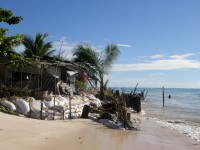
On Friday, the EPA finalized a rule that will reduce use of hydrofluorocarbons (HFCs), powerful greenhouse gases that are used in refrigerators and air conditioning, a step towards addressing an issue of vital concern to Ambassador Asterio Takesy of the Federated States of Micronesia. In an impassioned closing keynote address at last month’s event on Action in Climate Change and Health, co-hosted by PHI in connection with the UN Climate Summit in New York, Ambassador Takesy called for phasing out HFCs. Climate change, he said, poses an existential threat to the people of Micronesia.
HFCs have a global warming potential as much as 11,700 times that of carbon dioxide and stay in the atmosphere for up to 270 years. Ambassador Takesy emphasized the importance of updating the Montreal Protocol to restrict use of HFCs, an crucial near-term step to protect Micronesia from climate change. Like many small island nations, Micronesia is already experiencing serious impacts, and could be entirely wiped out by the sea level rise projected to happen within this century.
Video of the Ambassador’s keynote address will be available at the Action in Climate Change and Health event website by early November. Check back here, or follow @ClimateHealthCx for announcement of the video’s release.


